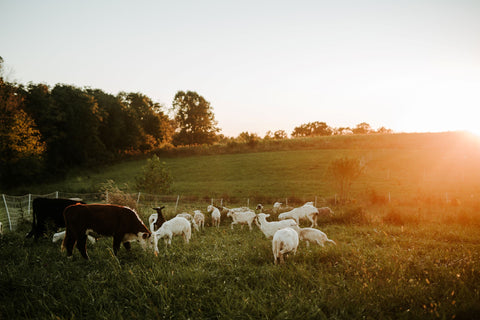A response to the Naysayers.

It seems that about once per year I see an article making a claim that farming, and sustainable farming specifically, isn't paying people an honest wage, has a dream vs. reality problem, or simply put, the recurring thesis is, "I tried. you just can't make it".
There's this popular one from the New York Times and this one more recently that claims, through cherry-picked statistics from one of the worst Midwest drought years in recent memory, that most farms in America lose money. And a new new one, in which someone with a white collar job seemed genuinely shocked when they raised their first crop, did no marketing, sold into a commodity-based system, and they were surprised that, despite their good intentions, they were paid the same as peasants and large mechanized farms are paid in that same system.
And this isn't a new argument, invented by the 21st century disillusioned young first generation farmer. There are versions of this joke that farmers who lived through the era when "get big or get out" was the official message like to tell, seemingly to hide the pain of opportunities long gone: "you know how to make a small fortune farming? You start with a large fortune." There's always someone out there who wants to throw cold water on your dreams. But in farming, it seems like there's been an over-abundance of grumpy people who prove the adage true, "whether you believe you can make it or you believe you can't make it, you're probably right."
Not so different from other businesses.
If someone opens up a comic book store and then goes under in the first five years, they don't write New York Times articles about the whole industry being a sham. The reality we all accept is some will make it and some won't. But those who do can thank their work and sacrifice and preparation, a number of skills they bring to the table, the help they get along the way, and luck. Those who don't can point to a mixture of those four elements as the reasons for it not working out.
The line of thinking in these articles ignores what farms have in common with the comic book store and all entrepreneurial endeavors:
-
Businesses have to compete in a marketplace
-
Businesses that can't find a niche to distinguish their product in the marketplace don't command a premium.
-
When businesses don't have scales appropriate to the premium they can command, the numbers don't work out.
-
Commodity businesses are typically not good businesses for small players.
-
Businesses that can't iterate and adapt don't last long.
-
Between all sectors of the economy there are a wide range of profit margins, firm failure rates, and current and future opportunities. (Agriculture, and specifically sustainable agriculture is far from being the worst in any of these categories.)
-
Regulations and subsidies will play a large role where present in any sector of the economy -both in the opportunities and pressures.
Here's the list of what I can say farming has that's unique and special, as it relates to business success:
-
Our line of work is, to varying but significant degrees, affected by the weather and natural processes.
Honestly, that's it. Farming is a business: one that happens mostly outside and is close to nature. If one wants to sell into a commodity copper mining market, they better have business savvy and millions of dollars worth of capital and economies of scale. If they want to sell into a copper jewelry market, they better be good at their craft, at marketing, at business planning, and some luck and help and hard work will go a long way too. Without those elements, their copper is worth a whopping $2.90/lb. With them, it's worth hundreds of times more. Whether or not it should be this way in farming is a fair question. But it is this way in farming.
All farm statistics are lies:
Or to put it more precisely, what they are measuring has nothing meaningful to add to this discussion.
"Number of farmers or farms" "Median Farm Income" "Farm Receipts" "acres owned" "acres under management" and so on are all entirely misleading numbers. Why? Because they include the grain farmer with 7000 rented acres and the retired couple with four cows trying to keep their 10 acre yard in a cheaper Ag land tax regime. They include the start-up veg farmer working a day job and the home school family that sells a few hundred cartons of eggs to friends and family each year for $3.50 in hopes of teaching their ten year old about business. Farm statistics in the US include anyone who produced food, fiber, fuel, or medicine, sold some, filed a schedule F with their federal tax return, and then returned the USDA survey they received in the mail. The statistics related to this subset of people does not tell you anything meaningful about the subset of people or businesses that grow your food, are farming full time, or the state of agriculture in general. That is a much smaller group of people with very different businesses than what the farm statistics represent.
Furthermore, even if the statistics could be focused in on the right group of people, they don't take into account many of the non dollar-denominated forms of payment inherent to this line of work: We eat like kings. There is plenty of fire wood in the stove. We live in paradise. Not only that. But we produce something that can be, and frequently is, bartered for many goods and services. While none of this is taken into account in the statistics, it all contributes to the relevant fact that we farm and we have enough money to get by.

The Truth
The truth is we are in a growing industry. And therefore, there are many opportunities. However you distinguish it: "niche", "sustainable", "integrity", "local", "organic", "craft", "artisan", "high end". Markets for foods with these adjectives attached are growing tremendously.
While it's true that the corporate pretenders know this and are seeing opportunity in this segment of the market, it's also true that there are an increasing number of growing startups and independent family farms in this segment. I can name dozens of sustainable, direct-market farms that produce millions in revenue, employ dozens of people, and prove it can be done in just about any part of the country. And for each one of those, there are hundreds of farms like mine: producing enough to sustain at least one family, and content to receive an adequate (and growing) mixture of monetary and non-monetary compensation for their efforts.
So what?
If you're interested in farming, learn to be an effective entrepreneur, or inherit a very successful, scaled-up commodity production business and then learn to manage it efficiently. Those are the primary paths I see working these days. And if you don't make it, or decide it isn't worth it to keep going, then there's no shame in having tried. You learned it wasn't for you, and you don't have to live with the regret of never pursuing your dreams. But please don't tell everyone that the structure of the market is so unfair that you don't see how anyone can make it; that it's not possible, not worth pursuing. That's not fair to the current or future farmers who are proving and will prove it is.
